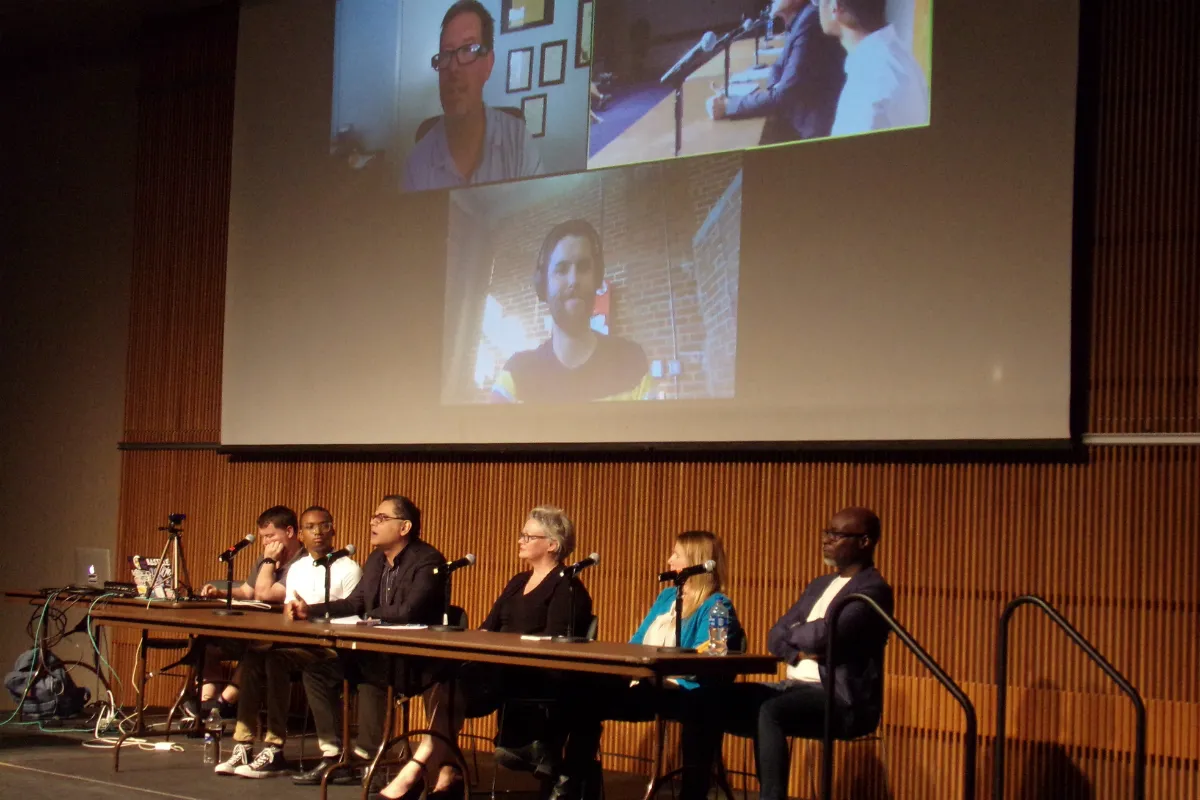A panel consisting of Ithaca College faculty, alumni and students came together to discuss the role of the media in democracy in the U.S. and around the world, as well as this generation of students’ ability to shape the industry.
The “Common Academic Experience Panel: Media and Democracy” was hosted by the Roy H. Park School of Communications on September 5, at 7 p.m. in Emerson suites. Panelists included:
- Raza Rumi, director of the Park Center for Independent Media;
- Ann-Marie Adams, instructor in the Department of Strategic Communication;
- Idrissou Mora-Kpai, assistant professor in the Department of Media Arts, Sciences and Studies;
- Allison Frisch, assistant professor in the Department of Journalism;
- Rob Flaherty ’13, digital director for the Beto for America campaign;
- Jim Miller ’85, executive director of Brave New Films; and
- Malick Mercier ’22, journalism student and social media influencer.
The discussion started with Park School Dean Diane Gayeski asking the panelists what worries them about the role the media plays in democracy today. In response, Mora-Kpai commented on the lack of diverse perspectives in the world and the exclusion of some voices from the media.
“There’s more perspective from the colonizer than the colonized and more perspective from men than women,” he said.
Adams spoke about different kind of media exclusion, noting that there is a lack of access to the media as well. She stated not everyone in the U.S. has access to news and the media because some people don’t have access to cable television or the internet. “We often times forget this fact and must constantly remind ourselves,” she said.
Flaherty talked about how the internet can be used to misinform the public and young people when they aren’t careful about checking a website's credibility. He also noted that people on the internet are becoming more desensitized to difficult topics. “Politics rely on young people’s apathy,” he said.
Frisch commented social media’s propensity to distract its users because trendy hashtags or viral stories often pull people’s focus away from important news items. She also lamented journalists’ tendency to pursue national news stories while ignoring important local stories that are just as consequential for democracy.
“Democracy happens at a grassroots level in our community,” Frisch said.
Rumi observed that roughly 2,000 local newspapers shut down last year. He said that because of the loss of local journalism, people often know about big, national issues, but don’t know as much about the smaller ones that affect their communities.
Mercier recounted his accomplishments as a young journalist, including covering the March for Our Lives for Instagram as a first-year student at IC. He said that the people in his generation see social media as an outlet that can be used to tell important stories, but cautioned civilian journalists that activism and journalism are not that same, and that journalists must remain objective in reporting the news.
Miller, who leads the social justice film studio Brave New Films, closed the discussion by giving advice to the students in the audience. He stressed the importance of persistence and curiosity, encouraging students to explore their passions and form relationships with different people.
Students in the audience said that they appreciated the panelists’ insights into the media industry and their advice for the up-and-coming generation.
“It was really inspiring and gave me a look into the industry as far as media goes,” said Nijha Young ’23, one of many first-year students wo attended the event. “Our potential is great. We shouldn’t feel limited or discouraged.”
